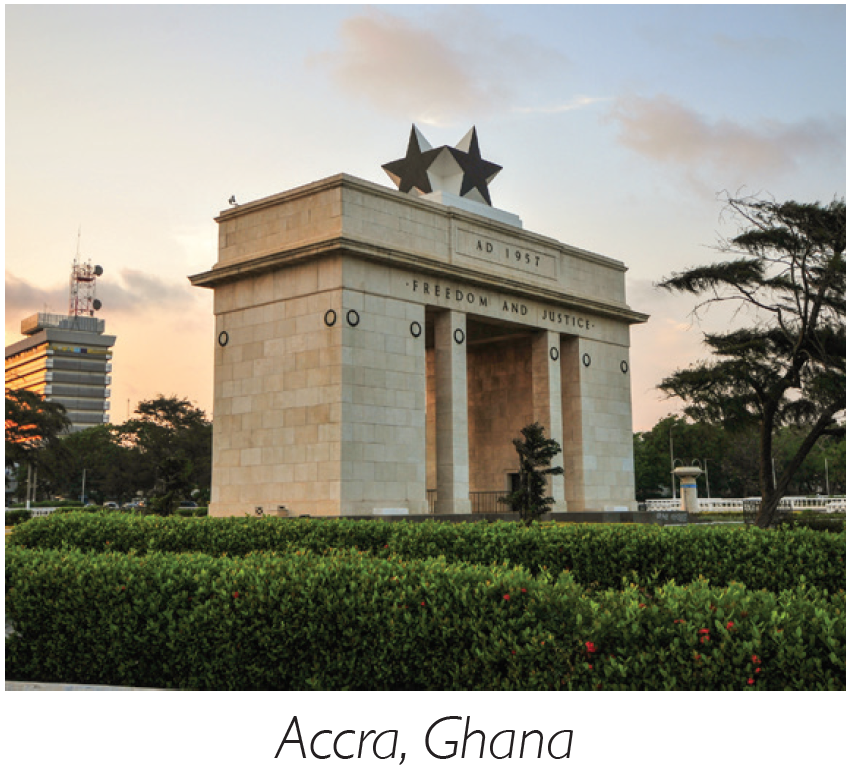Borrower Overview
TriLinc has provided financing to a juice processing and exporting company that sources from over 3,000 smallholder farmers in Ghana, providing them with more direct market access and fairer prices. Although the company specializes in juices produced from oranges and pineapples, it has recently expanded its product line to include apple, lemon, pear, pomegranate, and tropical fruit like acerola and passionfruit. To adopt sustainable practices and minimize waste, the company introduced its newest product line of “Cold Pressed Oil,” which utilizes the skin and excess juice of the fruit to create scented oils that will be used in the creation of perfumes, soaps, and candles. TriLinc’s financing will facilitate the installation of a 1,000 KW solar plant adjacent to the processing facility which will allow the company to become more independent from Ghana’s already stressed electricity supply, reduce the company’s reliance on diesel, and lower monthly electricity costs for the company while allowing the company to actually sell back excess generated power to the national grid. Additionally, with the expansion of the company’s processing activities, there is significant job creation opportunity, as the company typically employs roughly 100 extra seasonal staff working during the major season, in addition to its permanent employees.
Market Overview

Ghana is classified as a lower-middle income country by the World Bank.1 Between 2010 and 2016, the GDP growth rate averaged approximately 7.1%.1 Ghana’s main exports are concentrated in oil, gold, cocoa, timber, tuna, bauxite, aluminum, manganese ore, diamonds, and horticulture products. 2 This positions the country as the second largest cocoa producer internationally and the second largest gold producer in Africa.3 Conversely, the country’s main imports are focused in capital equipment, refined petroleum, and foodstuffs.2
Ghana meets TriLinc’s standards for its performance across relevant growth, stability, and access metrics.4 In 2017, it ranked 12th across the Sub-Saharan African region on the World Bank’s Ease of Doing Business index.5 Access to financing and corruption are seen as the most pressing hurdles currently facing the country’s productivity and competitiveness.6 As the 8th largest economy in Sub-Saharan Africa with a GDP of $42.7 billion, the country’s well developed financial sector, goods market, and highly efficient legal regimes led the country to benefit from the estimated $38.6 billion in foreign direct investment that flowed into the region in 2016.7 Robust domestic demand across Sub-Saharan Africa has helped spur regional GDP growth to 1.3% in 2016, and is projected to strengthen to 3.5% by 2019.8
Additional Sustainability & Impact Highlights
- To demonstrate high quality, transparency, and responsible sourcing within its business operations and product supply chains, the borrower reports that it has obtained the FLOCERT Fair Trade Certification, ECOCERT Organic Label, SGF Certification, EPA Approval, US and Ghana FDA Approval, and KOSHER Certification.
- The company reports that it supports the farmers it sources through providing resources and expertise to help lower production costs and improve the quality and quantity of crop yield. Roughly 1,500 farmers have participated in a six course module on citrus establishment, orchard maintenance, and harvest. During the training, the farmers gain access to the company’s training room and surrounding groves. In the future, the company plans to supply the farmers with high quality compost produced from the waste product at the company’s processing facility.
- Waste from the citrus processing facility can have high concentrations of citric acid, which can make its way into fresh water as runoff after rainfall, lowering the waters pH levels. The company reports that its waste treatment facility, which is inspected on a monthly basis, isolates solid organic and inorganic materials from entering the stream, adjusts the pH of the filtered water, and disinfects the filtered water before releasing it into the water stream.
- The company reports that it offers extensive employee benefits including 10% of employee basic salary allocated to housing; 13% of employee basic salary for social security; allowances for medical leave and family bereavement; minimum of three months full pay for sick leave; upon retirement, one and a half months basic salary for each year of service; upon layoff, four months of salary for each year of service; end of year bonus package that includes 10kg of rice, one gallon of cooking oil, one fowl, and one gallon of fruit juice; in addition to long service awards for employees who have worked at the company for five and 10 years.
1The World Bank, World Development Indicators Database, Ghana, 2017. 2CIA, The World Factbook, 2017: Ghana. 3The Observatory of Economic Complexity, 2016. 4There is no assurance that our investment in this company or this market will be successful. 5World Bank’s Ease of Doing Business 2017: Ghana. 6World Economic Forum, The Global Competitiveness Report, 2017. 7The World Bank, World Development Indicators Database, Sub-Saharan Africa, 2017. 8World Bank, Global Economic Prospects, 2017.
The above information is as of the initial date of investment: December 22, 2017.
An investment with TriLinc carries significant fees and charges that will have an impact on investment returns. Information regarding the terms of the investment is available by contacting TriLinc. This is a speculative security and, as such, involves a high degree of risk. Investments are not bank guaranteed, not FDIC insured and may lose value or total value. Some investments may have been made in an investment vehicle that is no longer open for investment. The highlighted investment may or may not have been profitable. There is no guarantee that future investments will be similar.
Want to learn more? Contact Us.
